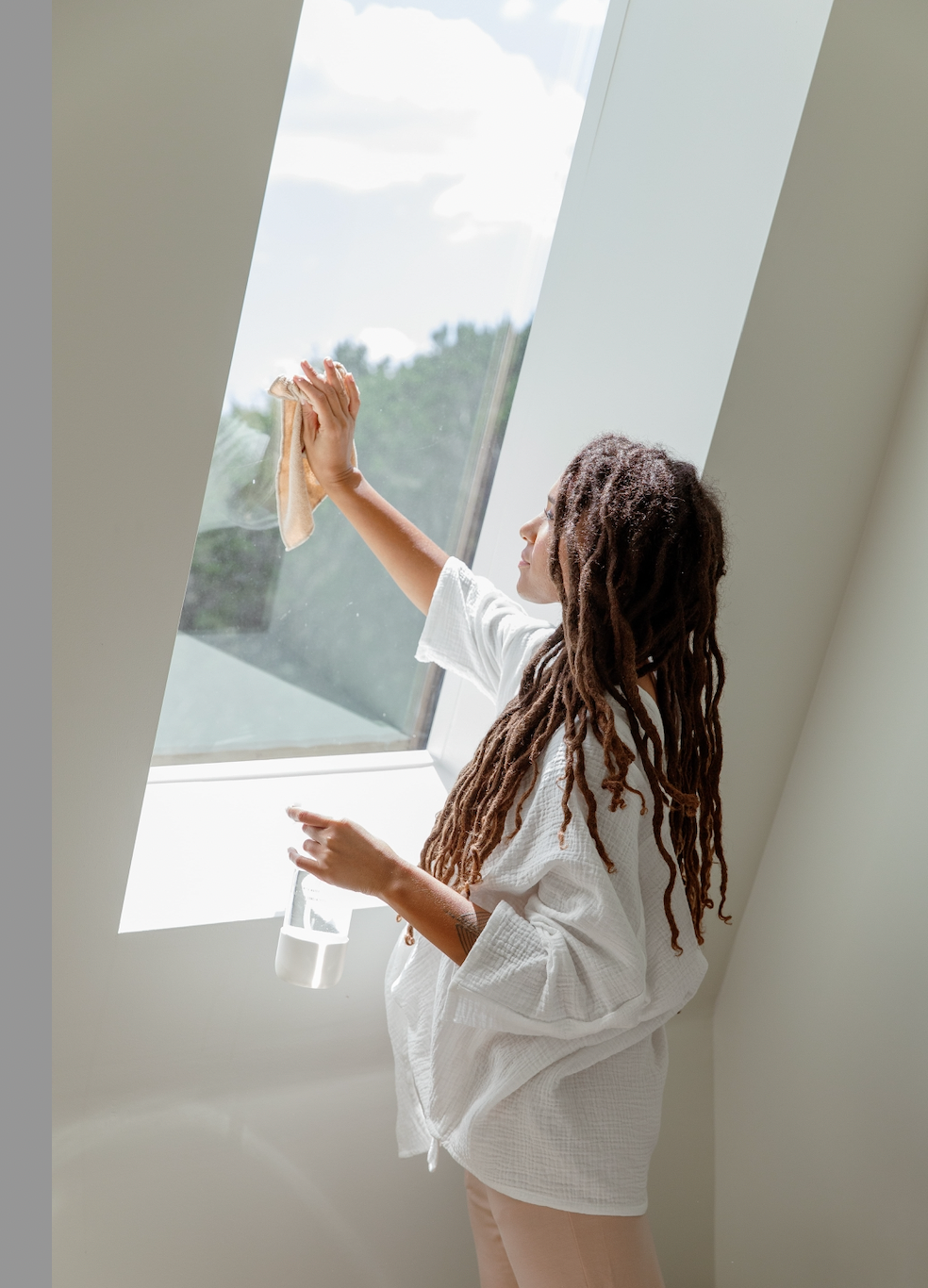The 6 Best Glass Cleaners Without Ammonia

Did you grow up smelling of ammonia every time your parents cleaned the windows or mirrors?
If so, you’re not alone.
Ammonia-based cleaners have been considered the gold standard in streak-free glass cleaning for decades.
However, ammonia is one of the most toxic cleaning product ingredients and is not necessary for achieving a streak-free, spotless windows, mirrors, stovetops, and more.
In this article, we’ll share five of the best glass cleaners without toxic ammonia, with premade and DIY options for every lifestyle and budget.
Why is Ammonia Harmful?
Given ammonia’s widespread use as a household cleaner and disinfectant for generations, it may be hard to believe it’s harmful.
However, ammonia hydroxide, the type used in glass cleaners, is considered a “high hazard” by OSHA and can cause severe skin burns and eye damage, irritation to mucous membranes, respiratory problems, and life-threatening pulmonary edema. It’s also extremely toxic to aquatic life.
Ammonia is also produced naturally by the human body, in urine, for example, and in nature.
However, chemically produced, concentrated ammonia is not the same as the ammonia your body creates and excretes.
So don’t be fooled by “experts” or cleaning companies insisting ammonia is “natural” and, therefore, a generally safe product when used in small amounts.
Ammonia exposure can result in the following:
Inhalation:
- Bronchiolar and alveolar edema and airway destruction resulting in respiratory distress or failure (death)
- Coughing, and nose and throat irritation
- Drooling
- Immediate burning of the nose, throat and respiratory tract
- Irritation or damage to the mucous membranes
- Trouble breathing
- Wheezing
Skin or eye contact:
- Blindness and irreparable eye damage
- Frostbite injury
- Rapid skin and eye irritation
- Severe injury and burns to eyes and skin
Ingestion:
- Corrosive damage to the mouth, throat, and stomach
- Liver and kidney damage
Unfortunately, regular or chronic exposure to low levels of ammonia via cleaning products has been proven very harmful to the lungs.
Research published in the American Journal of Respiratory and Critical Care Medicine showed individuals who used ammonia daily for household cleaning for 20 years had decreased lung function, equivalent to smoking 20 cigarettes daily.
Add all this up, and reducing the amount of ammonia exposure you can control at home makes sense.
The best way to do this is to ditch ammonia-based cleaners, including glass cleaner.
For a deeper dive into the history and harms of ammonia and what types of cleaning products contain ammonia (beyond glass cleaners), check out: 5 Ammonia-Free Cleaning Products.
Recommended Glass Cleaning Supplies
The supplies you’ll need for ammonia-free glass cleaning are the same as what you’d use with any kind of glass cleaner.
However, you’ll need specific ingredients if you’re making DIY glass cleaner.
Here’s a basic list of recommended glass cleaning supplies:
- A microfiber cloth, glass cleaning cloth, or natural paper towels.
- An empty spray bottle for DIY cleaning.
- Distilled water for DIY cleaners.
- This is especially important for those with hard water, which can leave spots and streaks on glass.
Without further ado, here are our top 5 recommendations for human-safe ammonia-free glass cleaners.
1. Branch Basics Streak-Free
Streak-Free is possibly our most beloved product because it only takes one drop of Branch Basics Concentrate to make!
You read right. More is not better! If there is streaking, you have used too much.
One drop of Branch Basics Concentrate + Water makes enough ammonia-free glass cleaner to last for months and months.
Plus, it works just as well (if not better) than ammonia-containing products.
Streak-Free can be used to clean:
- Mirrors
- Windows
- Glass stovetops
- Glass coffee tables
- Car windows
- Shower doors
- And any type of glass in your home
For those unfamiliar with Branch Basics, our line was created to replace every single cleaning and laundry product in your home with just one all-natural, human-safe Concentrate.
This Concentrate is designed to be diluted to create All-Purpose, Bathroom, Streak-Free, Foaming Wash, Laundry, Floor Cleaner, and more.
Check out our Starter Kits to learn more about Branch Basics all-in-one human-safe cleaning system.
2. Vinegar + Water
Distilled white vinegar is a favorite among chemical-conscious consumers and DIY enthusiasts because:
- It’s non-toxic
- It’s cheap
- It’s easy to find
- It has natural disinfectant properties
- And it’s a great cleaner, stain remover and degreaser
It also works wonders on glass.
To use:
- Dilute white vinegar with water in a 50:50 solution.
- Spray on the glass and wipe clean.
Remember that although vinegar is a natural product, it contains acetic acid, a respiratory irritant when made airborne by spraying. Ventilate when cleaning!
Therefore, if you’re sensitive, have a respiratory condition, babies or young children in the house, etc. opt for another of these human-safe glass cleaning options.
Discover more in: How to Clean Your Windows With Vinegar: Our Method
3. Hand-Held Steam Cleaners
Hand-held steam cleaners are excellent for non-toxic disinfecting and can be used to clean glass.
Follow the manufacturer’s instructions, which typically mean spraying steam at the glass and then wiping it down with a microfiber cloth.
Steam cleaners also work well with Branch Basics or the other human-safe cleaners listed here.
Here are some tips to keep in mind when using steam to clean:
- Always use distilled water. Hard water can clog and ruin the steamer, which are almost impossible to fix.
- Keep out of reach of children! Steam cleaners are fascinating to most children but can cause severe burns, so use and store them with caution.
- Read reviews carefully when selecting a steam cleaner. Typically, it’s worth paying a little more for a model that will last longer.
4. 3% Hydrogen Peroxide
3% hydrogen peroxide (in the brown bottle) can be sprayed directly on glass to remove dirt, grime, and smudges.
There is no need to dilute 3% hydrogen peroxide because it’s already diluted with 97% water. Just affix a spray nozzle to the bottle, or pour a little on a cloth, and wipe down your glass.
Hydrogen peroxide is considered non-toxic because it breaks down into hydrogen and oxygen in water.
Note: 3% hydrogen peroxide should be stored in a dark-colored bottle out of direct heat and sunlight to prevent degradation.
Get the full story on hydrogen peroxide for non-toxic cleaning: How To Use Hydrogen Peroxide as a Safer Alternative for Cleaning, Disinfecting, Laundry, & More.
5. Vinegar + Natural Dish Soap or Castile Soap
If you aren’t getting the desired results with vinegar and water, try adding a few drops of a natural and human-safe dish or liquid castile soap.
Here’s a basic recipe:
- 1 cup distilled water
- 1/4 cup vinegar
-
2-3 drops human-safe dish soap or unscented liquid castile soap
-
For human-safe dish soap, we recommend:
- Branch Basics Concentrate (just 1 drop will do)
- Fragrance-Free AspenClean
- Fragrance-Free Attitude
- For liquid castile soap, we recommend
-
For human-safe dish soap, we recommend:
Combine everything together in a spray bottle, shake, and it’s ready to use.
6. Rubbing Alcohol
If you have plain rubbing alcohol around the house, you can use it to clean all types of glass and mirrors.
Rubbing alcohol has many of the same properties as ammonia, which makes it effective for cleaning off smudges and creating a streak-free shine.
However, we recommend rubbing alcohol with reservations (which is why we’ve listed last).
Although rubbing alcohol is better than ammonia or other chemical-based glass cleaners, we do not recommend it for those with lung issues, people with young babies or children around, or anyone with chronic illness.
Regular exposure to rubbing alcohol—or any concentrated alcohol—can disrupt the microbiome, leave behind resistant bacteria, and may cause lung irritation.
Plus, if used without proper ventilation or if spilled, it can create a hazard.
If this concerns you, we recommend using a different ammonia-free glass cleaner.
To use rubbing alcohol on mirrors:
- Ventilate the room well.
- Using gloves (because the skin absorbs alcohol), spray undiluted alcohol on the glass, wipe, and you’re done.
Interested in more information on the safest sanitizers and disinfectants? Check out: 9 Natural Alternatives to Bleach for Disinfecting.
Natural Glass Stove Cleaning Tips
If you’re thinking your glass stovetop cannot come clean without ammonia, consider this.
Ammonia-based glass cleaners are not recommended by manufacturers for glass stovetops because they can cause streaking or permanent damage.
Instead, consider these ammonia-free glass stove cleaning options:
- Always let the area cool before using any type of stovetop cleaner.
- Use Branch Basics All-Purpose dilution instead of Streak-Free for messy stove tops.
- Use a drop of vinegar to clean up grease and stubborn spills. For stubborn messes, let dwell for 5-10 minutes.
- For stuck-on messes, use a paste of baking soda and water applied with a soft bristle brush OR Branch Basics All-Purpose with a sprinkle of Oxygen Boost. Let sit for 5-10 minutes. Scrub gently with a non-scratch sponge or microfiber. Wipe clean.
For more helpful tips on natural, ammonia-free glass stovetop cleaning, see: How To Clean A Glass Stovetop Naturally.
Toss the Toxins With Branch Basics
Isn’t it a breath of fresh air to know you can give up those awful-smelling ammonia-based glass cleaners for a natural and healthier option?
For more human-safe cleaning tips, check out our Wellness Center for articles, Podcasts, Guides, and more.
Got Questions? We’ve Got Answers
Giving up your go-to ammonia-based glass cleaner can be intimidating (especially for us glass-cleaning fanatics).
To help, we’re answering some frequently asked questions about human-safe, natural glass cleaning.
How effective are natural glass cleaners compared to chemical ones?
Given the popularity of ammonia-based glass cleaners, you’d think anything else would pale in comparison.
However, natural glass cleaners can be even more effective than ammonia-based cleaners.
Still not convinced? Try out a few of the recommended ammonia-free glass cleaners shared in this article and see for yourself.
No matter how particular you are about your glass cleaner, we’re confident you’ll find a comparable (and likely better) human-safe solution.
How cost-effective is Branch Basics compared to other cleaners?
Many people put off switching from chemical to human-safe cleaners because of misconceptions about price.
And with inflation driving up the price of everything these days, we certainly understand the concern.
Although safe & healthy cleaners can vary widely in price, Branch Basics is a very cost-effective option.
For example, just one bottle of Branch Basics Concentrate is enough to make:
- 3 All-Purpose Bottles for $3.09 each
- 3 Bathroom Bottles for $6.18 each
- 3 Streak-Free Bottles for $0.49 each
- 64 Loads of Laundry at $0.26 per load
- 3 Foaming Wash Bottles at $3.09 each
You can even use your own glass, plastic, or stainless steel bottles with these handy formulas.
Can Branch Basics be used on other surfaces besides glass?
You bet.
Branch Basics, in varying dilutions, can be used on countertops, tubs, showers, tile, stainless steel, grout, LVP, wood flooring, sealed concrete, ovens, cars, upholstery, carpet, toys, walls, ceilings, and so much more!
It really is an all-in-one, use-it-everywhere kind of all-natural, human-safe cleaning product.
Discover more in: Safer Healthier Cleaning Hacks: 21 Unique Ways to Use Branch Basics and The Branch Basics Users Guide.

Marilee Nelson
Marilee Nelson is an Environmental Toxins expert who has spent nearly 30 years advocating for the chemically-sensitive and chronically-ill. She is a Board Certified Nutritionist, Certified Bau-Biologist and Bau-Biology Inspector and specializes in Food As Medicine. She has helped thousands of families and individuals identify, heal and recover from toxic exposures and is on a mission to revolutionize the way American families view their health.








